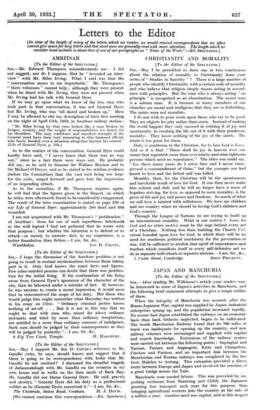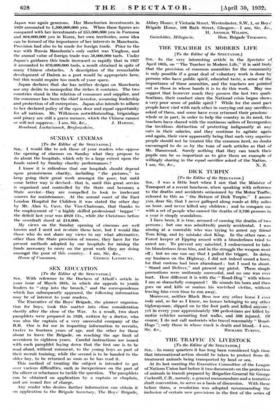JAPAN AND MANCHURIA
[To the Editor of the SPErravon.] Sia,—After reading Mr. Wilkinson's article your readers may be interested in some of Japan's activities in Manchuria, and the following brief statement attempts to give a rough outline of these.
When the integrity of Manchuria was assured, after the Russo-Japanese War, capital was supplied by Japan, industrial enterprises sprang up, and the population increased rapidly. No sooner had Japan established the railways on an economic basis than land, hitherto neglected, began to be cultivated. The South Manchurian Railway found that its 700 miles or track was inadequate for opening up the country, and new railway schemes were encouraged and supplied with capital and expert knowledge. Extensions of the railway system were carried out between the following points : Supingkai and Taonan, Taonan and Angangchi, Kirin and Changchun. Cinchou and Fueltou, and an important link between the Manchurian and Korean railways was completed by the line from Mukden to Antung. This extension provided a direct route between Europe and Japan and involved the erection of a great bridge across the Yalu.
Manchuria soon needed labour. This was provided by im- porting workmen from Shantung and Chihli, the Japanese granting free transport each year for this purpose, thus bringing agricultural workers into the country at the rate of a million is year, Another need was capital, and in this respect Japan was again generous. Her Manchurian investments in 1929 amounted to 1,500,000,000 yen. When these figures arc eompared with her investments of 355,000,000 yen in Formosa and 804,000,000 yen in Korea, her own territories, some idea can he formed of the importance of her interests in Manchuria. Provision had also to be'made for foreign trade. Prior to the war with Russia Manchuria's only outlet was Yingkou, and the annual value of foreign trade was 58,000,000 tack. Under Japan's guidance this trade increased so rapidly that in 1927 it amounted to 670,000,000. taeLs, a result obtained in spite of many Chinese obstacles. A description of the remarkable development- of Dairen as a port would be appropriate here; but this would require too much of your space.
Japan declares that she has neither designs on Manchuria nor any deiire to monopolize the riches it contains. The two countries stand in the relation of consumer and supplier, and the consumer has been the chief investor, assuming lvadership and protection of a l enterprises. Japan also intends to adhere to her declared policy of the open door and equal opportunity for all nations. Mr. Wilkinson notwithstanding, brigandage' and piracy are stilt a grave menace; which I he Chinese cannot
or will not suppress.74 any Sir, dm., , J. ItomM. Braehead LochwitatiOch, Reofrewshire.







































 Previous page
Previous page